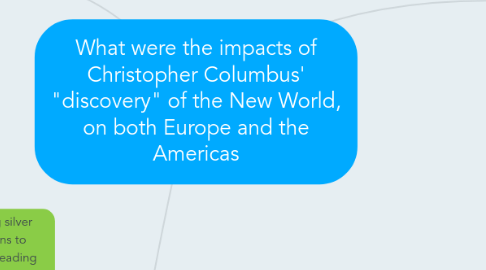What were the impacts of Christopher Columbus' "discovery" of the New World, on both Europe and the Americas
создатель Courtney T


1. Americas
1.1. Disease: The Europeans brought diseases to the Americas that the natives were unfamiliar with, leading to thousands of Native American deaths (Measles, chickenpox, smallpox, typhus)
1.2. Colonization: Europeans realized the profitability of colonization. The tactics of using weapons to dominate native peoples and employ forced labor was seen as an economic gain
1.3. Slavery: Europeans eventually brought slaves to the New World, introducing slavery to the Americas
1.4. Expansion: Columbus' voyage encourage Spanish explorers to claim new colonies for Spain.
2. Both
2.1. Slavery: In general, Columbus' voyage lead to a huge expansion of the slave trade (this is extended even farther than Europe and the Americas)
2.2. Columbian Exchange: Ships took items like corn, potatoes, and tobacco from the Americas to Europe and Africa
2.3. Economic Gain: Silver and Gold The discovery of silver and gold in the Americas effected both Europe and the New World Europe: Encouraged European exploration to the New World in search of silver and gold for the country, as well as land Americas: Did not help the Natives but did increase trade between the Americas and other countries (increased general economic growth)
3. Europe
3.1. Economic Gain: The Europeans used colonization to provide wealth and resources for their own kingdom
3.2. Migration/Expansion: Columbus' voyage encouraged Europeans to further explored the world (One of the biggest voluntary migrations in world history)
3.2.1. Competition: -These increased expeditions inflamed national rivalries in Europe -Lead to creation of treaties over who owned which portions of land (Treaty of Tordesillas)
3.2.2. Trade: Increased exploration allowed for more trade with other countries
